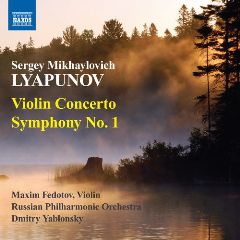Lyapunov - Violin Concerto - Symphony No. 1 (2011)
Lyapunov - Violin Concerto - Symphony No. 1 (2011)

1. Violin Concerto in D Minor, Op. 61 00:22:59 Symphony No. 1 in B Minor, Op. 12 2. I. Andantino 00:13:12 3. II. Andante sostenuto 00:10:08 4. III. Scherzo: Allegretto vivace 00:08:16 5. IV. Finale: Allegro molto 00:09:31 Maxim Fedotov – violin Russian Philharmonic Orchestra Dmitry Yablonsky - conductor
Only last issue I waxed ecstatic about Yablonsky’s recording of Liapounov’s piano concertos and Ukrainian Rhapsody with Shorena Tsintsabadze, and already we have a splendid follow-up that will surely be welcomed by lovers of lush Russian music. Here is the heart and soul of Mother Russia writ large and played with great gusto and warmth by one of Russia’s foremost orchestras under committed leadership. Neither of these works might be casually dismissed as over-recorded—this is the only account of the Violin Concerto I know of outside of a long deleted monaural Melodiya LP.
Keith Anderson reminds us in his absorbing essay that Liapounov was a generation removed from the earlier nationalist tradition; while he remained close friends with Balakirev, he may have found it difficult to develop an individual musical style with Balakirev looking over his shoulder. Rimsky-Korsakoff found Liapounov quite lacking in originality, sometimes sounding like Balakirev, sometimes like Glazounov. No doubt you’ll hear both of them in the First Symphony. If the sonorous opening motif in the horns suggests the Second Symphony of Glazounov—and before that the Borodin—much of what follows seems as like as two peas to Balakirev’s First Symphony (begun 10 years before the Liapounov and completed ten years after), though the ingenious transformation of the horn motif into the vigorous Allegro is once again akin to the Glazounov. A poignant strain by the bass clarinet does little to abate the torrential energy that surges inexorably to a grand peroration pitting churning strings against the full force of the stentorian low brass—just like the Balakirev.
And we may think of Balakirev in the spacious and expressive cantilena that follows, opening up in the clarinet, effectively warding off the stern pronouncement by the low brass midway in that might be the grumbling of some venerable council of boyars before the strings swelling with optimism restore order—here the Andante of Glazounov’s Fifth Symphony comes to mind. The gossamer Scherzo conjures some Russian fairy revels, and the opening horn motif returns with an almost martial bearing. A yearning strain is introduced by the horn that Liapounov works up to grand effect before the mood brightens, closing out in triumph as Glazounov did so brilliantly in his later symphonies.
This is robust and hearty fare, and Yablonsky gives the symphony a big sloppy Russian bear hug worthy of his mentor Rostropovich, lavishing great affection and warmth on this often sprawling essay that in lesser hands could very easily come undone. Aided by warm, expressive playing from the strings—with spacious sonics to match—Yablonsky marshals the full force of the Russian low brass where called for. The unhurried, deeply felt Andante, here a true sostenuto, almost steals the show.
The Violin Concerto—written nearly 30 years after the symphony—clearly reinvents the one Glazounov composed nine years earlier. If anything, Liapounov summons more sinew than Glazounov, whose endless flow of melody begins to cloy after a while; but for all his energetic effort and warmth of expression he must yield to his esteemed colleague in the closing pages—they cannot match Glazounov’s highly effective “Red Square” finale. And the extended cadenza near the end—some four minutes in this performance—all but brings the festivities to a halt. Maxim Fedotov here seems entirely in his element and is warmly supported by the Russian players. They may well persuade you that this is one of the great Russian concertos. And Fedotov redeems the composer’s seemingly interminable cadenza with an impassioned, hair-trigger display that will have you hanging on every note. ---Steven J Haller, naxos.com
download (mp3 @320 kbs):








